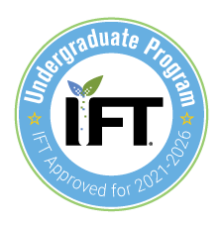Food Science Major
Bachelor of Science in Agriculture
Do you love food?
Food Science students study microbiology, chemistry and engineering—programs of study necessary to understand the nature of foods and the underlying principles of food processing and preservation. This knowledge is used by food scientists to make food safer, healthier, more tempting and less likely to spoil.
Food Science courses include:
- Food Processing where you will learn about the principles behind operations in manufacturing plants to process, package, and preserve foods;
- Food Microbiology which describes the microbes that spoil foods, make us sick, or preserve foods and how they can be measured and controlled;
- Food Chemistry teaches about the chemicals in foods that contribute to the quality, safety, and nutrition as they are affected by food processes;
- Nutritional Quality which describes the effects of food preservation the nutritional quality of foods;
- Instrumental Methods of Food Analysis covers the techniques used to determine the chemical components of foods;
- Food Quality Control teaches about developing systems to maintain quality of food products and prevent food hazards;
- Governmental Regulation of Food Safety and Quality where you will learn about how the government protects our food supply;
- Food Fermentations teaches how microbes preserve foods such as beer, bread, sausage, and yogurt;
- New Food Product Development where will you learn about the intricate process of designing a new food product and develop a new product as part of a team; and
- Hazard Analysis and Critical Control Point which describes a system used to prevent food hazards before they occur.
Hands-On Learning
- Labs focusing on food products, food safety and food analysis
- Experience with industry-related technologies
- Food Science Senior Project
- Undergraduate research opportunities
- Participate in student clubs and organizations
- Internship opportunities
- Study abroad opportunities
Hoping to land a good job after graduation?
Students graduating with an undergraduate degree in Food Science are in demand and will find rewarding careers in several areas of specialization.
Scholarships
Food Science and Technology scholarships are awarded each academic year through an application process that opens each spring.
Each year the College of Agricultural and Environmental Sciences (CAES) awards scholarships to students enrolled in our majors. View scholarships and apply on the CAES Scholarships page.
Financial Aid
To find out about deadlines and eligibility requirements, visit the University of Georgia Office of Student Financial Aid.
Andrew Widmer (BSA '21)
Food Science student, Andrew Widmer, talks about his experience as a food science student.
Have questions about the Food Science major?
Contact Dr. Critzer using the information below, or use the form to schedule a video chat.


